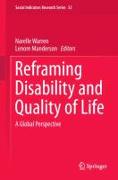Reframing Disability and Quality of Life
BücherAngebote / Angebote:
Chronic conditions and physical impairments can take a psychological, social and economic toll, and are assumed to diminish a person’s quality of life. But ‘quality of life’ is an ambiguous phrase. Some use the term as an indicator for successful and high quality health services, including good access to medical attention and surgery, others use the term to argue against medical interventions that are seen to prolong life for its own sake. The meaning of ‘quality of life’ varies from person to person, and so is contextually fluid: it may be shaped by health status, presence or absence of pain, happiness and acceptance, or fluctuations in social and economic status. The authors in this book offer a unique and timely collection of papers that address many of these issues, in the context of the lived experience and subjective wellbeing of people with a range of medical conditions from very different cultural and economic environments. In doing so, they address the limits of psychometric measurement and the challenges in generating information about quality of life and wellbeing at both individual and population levels. Authors confront the obstacles of interpreting health outcomes among people of different cultures, ages, genders and health statuses, so supplementing quantitative data with rich ethnographic discussion and illustrating the value of mixed methods research. This book is fundamental to the emerging debates related to individual health outcomes. In striving to understand the broader contextual factors of chronic illness and disability, this volume will contribute to our knowledge of the services, support systems and infrastructure that provide a higher quality of life to people, regardless of their physical health, capability and functioning.
Folgt in ca. 15 Arbeitstagen




